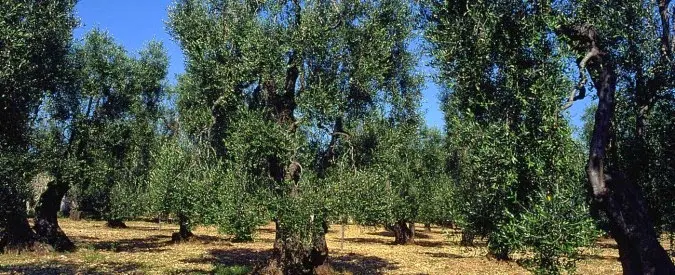The disease that carries off the olive trees of Salento may have been induced?
The prosecutor of Lecce is at work and plant diseases in the relationship ends on agromafie coordinated by magistrate Caselli, so "there are concomitants abnormal".
The president of Eurispes, Fara: "It seems there is a case of a chemical warfare". Hypothesis predicted by scientists
From Brazil or Costa Rica? By the uncontrolled import of ornamental plants or for experimentation wanted and ended badly? What looks like the plot of a spy story becomes an accredited course of study on the introduction of the bacterium in Puglia quarantine Xylella fastidiosa.
Coincidences, so many. And now some evidence deemed credible: the Prosecution of Lecce for a year trying to curl up the mess to try to explain why they continue to dry the olive trees of Salento and to name those responsible for the crime of "willful dissemination of a plant disease ".
The presence of the pathogen, considered one of the causes of mortality of trees, "aspects of which may be beyond the fatality," says Gian Carlo Caselli, former chief prosecutor of Turin and Chairman of the Scientific Committee on crime in agriculture.
He coordinated the third report on agromafie: the first chapter is devoted to the story of Salento.
That report, promoted by Coldiretti, was realized together all'Eurispes, whose chairman, Gian Maria Fara, goes even further: "It is a unique story.
For its contours and implications, has no equal. Xylella that was imported is a fact as well that in this story seem to be all the conditions of a bacteriological or chemical warfare. " A fantasy? Not really, at least to read the studies done in 2008 by the European Network of bacteriologists, established as part of the COST 873: "Of all the bacterial species listed, only Ca. Liberibacter spp. and Xylella fastidiosa, both pathogenic to citrus fruits, may be considered to satisfy the criteria proposed for biological weapons. The cultivation of citrus is the basic industries of juices and fruits, companies that are so large that serious damage to them could have significant consequences for these economies in the US and Europe, where the pathogen is not yet present. "
The prosecutor of Lecce is at work and plant diseases in the relationship ends on agromafie coordinated by magistrate Caselli, so "there are concomitants abnormal".
The president of Eurispes, Fara: "It seems there is a case of a chemical warfare". Hypothesis predicted by scientists
From Brazil or Costa Rica? By the uncontrolled import of ornamental plants or for experimentation wanted and ended badly? What looks like the plot of a spy story becomes an accredited course of study on the introduction of the bacterium in Puglia quarantine Xylella fastidiosa.
Coincidences, so many. And now some evidence deemed credible: the Prosecution of Lecce for a year trying to curl up the mess to try to explain why they continue to dry the olive trees of Salento and to name those responsible for the crime of "willful dissemination of a plant disease ".
The presence of the pathogen, considered one of the causes of mortality of trees, "aspects of which may be beyond the fatality," says Gian Carlo Caselli, former chief prosecutor of Turin and Chairman of the Scientific Committee on crime in agriculture.
He coordinated the third report on agromafie: the first chapter is devoted to the story of Salento.
That report, promoted by Coldiretti, was realized together all'Eurispes, whose chairman, Gian Maria Fara, goes even further: "It is a unique story.
For its contours and implications, has no equal. Xylella that was imported is a fact as well that in this story seem to be all the conditions of a bacteriological or chemical warfare. " A fantasy? Not really, at least to read the studies done in 2008 by the European Network of bacteriologists, established as part of the COST 873: "Of all the bacterial species listed, only Ca. Liberibacter spp. and Xylella fastidiosa, both pathogenic to citrus fruits, may be considered to satisfy the criteria proposed for biological weapons. The cultivation of citrus is the basic industries of juices and fruits, companies that are so large that serious damage to them could have significant consequences for these economies in the US and Europe, where the pathogen is not yet present. "
- Economic reforms in Italy
- Italy and chinese World Bank

Commenti
Posta un commento